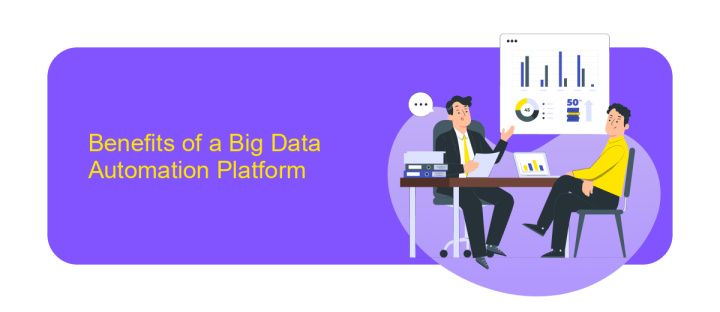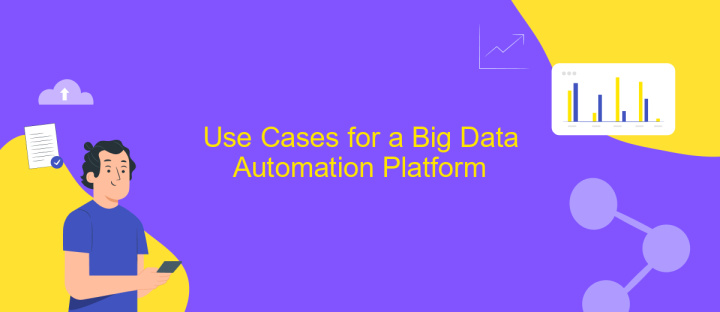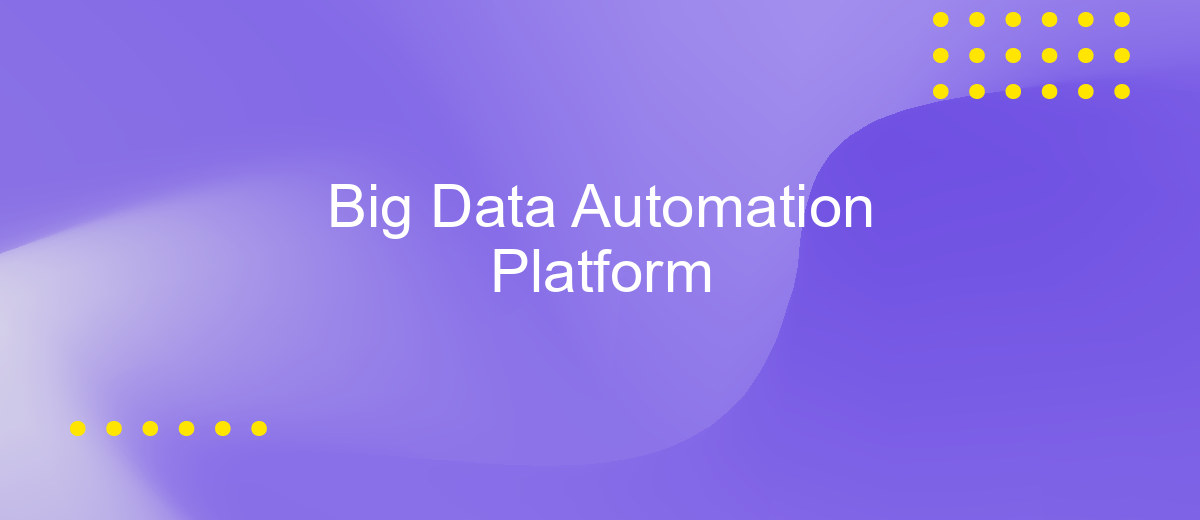Big Data Automation Platform
In today's data-driven world, the ability to efficiently manage and analyze vast amounts of information is crucial. The Big Data Automation Platform emerges as a transformative solution, streamlining data processes and enhancing decision-making capabilities. By automating complex data workflows, this platform empowers businesses to harness the full potential of their data, driving innovation and gaining a competitive edge in the rapidly evolving digital landscape.
Components of a Big Data Automation Platform
A Big Data Automation Platform is a comprehensive solution designed to streamline the process of managing and analyzing large datasets. It integrates various components that work together to automate data collection, processing, and analysis, enabling businesses to make data-driven decisions efficiently. These platforms are essential for organizations looking to harness the power of big data without the complexities of manual handling.
- Data Ingestion: Automates the collection of data from diverse sources, ensuring seamless integration and storage.
- Data Processing: Utilizes advanced algorithms to clean, transform, and prepare data for analysis.
- Data Storage: Provides scalable storage solutions to accommodate vast amounts of data securely.
- Analytics Engine: Offers tools for real-time data analysis, visualization, and reporting.
- Workflow Automation: Automates repetitive tasks, enhancing efficiency and reducing human error.
By incorporating these components, a Big Data Automation Platform empowers organizations to optimize their data strategies, improve operational efficiency, and gain valuable insights. This integration of technologies not only simplifies data management but also accelerates the decision-making process, giving businesses a competitive edge in the data-driven landscape.
Benefits of a Big Data Automation Platform

A Big Data Automation Platform offers numerous advantages, streamlining data processing and management tasks that were traditionally time-consuming and prone to error. By automating data workflows, businesses can significantly reduce operational costs and improve efficiency. The platform enables real-time data analysis, allowing companies to make informed decisions quickly, which is crucial in today’s fast-paced market environment. Moreover, automation minimizes human intervention, reducing the likelihood of errors and ensuring data integrity.
Integration capabilities are another vital benefit of a Big Data Automation Platform. Tools like ApiX-Drive facilitate seamless integration between various data sources and applications, enabling businesses to consolidate their data in one place. This integration not only enhances data accessibility but also provides a holistic view of business operations, leading to better strategic planning. Additionally, the platform's scalability ensures that as a business grows, its data management capabilities can expand accordingly, ensuring long-term sustainability and adaptability to changing technological landscapes.
Use Cases for a Big Data Automation Platform

Big Data Automation Platforms have revolutionized the way organizations handle vast amounts of data, providing streamlined processes and actionable insights. These platforms enable businesses to automate data collection, processing, and analysis, leading to more efficient operations and strategic decision-making.
- Data Integration: Automate the integration of diverse data sources, ensuring seamless data flow and consistency across systems.
- Real-time Analytics: Enable real-time data processing and analysis, allowing for immediate insights and quicker response times.
- Predictive Maintenance: Analyze historical data to predict equipment failures, reducing downtime and maintenance costs.
- Customer Segmentation: Automate the segmentation of customers based on behavior and preferences, enhancing targeted marketing strategies.
- Fraud Detection: Implement automated algorithms to detect fraudulent activities by analyzing patterns and anomalies in data.
By leveraging these use cases, businesses can significantly enhance their operational efficiency and decision-making processes. Big Data Automation Platforms not only reduce the manual effort involved in data management but also provide a competitive edge by delivering timely and accurate insights. As data continues to grow in volume and complexity, these platforms will become increasingly vital in maintaining agility and innovation in various industries.
Challenges of Implementing a Big Data Automation Platform

Implementing a Big Data Automation Platform presents numerous challenges that organizations must navigate to achieve success. One of the primary hurdles is the integration of diverse data sources, which often involves varying formats and structures. Harmonizing these data sources into a cohesive system requires sophisticated data mapping and transformation processes.
Another significant challenge is ensuring data quality and consistency. With the vast volume of data being processed, maintaining high standards of data integrity becomes increasingly complex. Organizations must implement stringent data validation and cleansing protocols to avoid compromising the insights derived from their data.
- Scalability: As data volumes grow, the platform must efficiently scale to handle increased workloads.
- Security: Protecting sensitive data against breaches and unauthorized access is paramount.
- Cost: Implementing and maintaining such platforms can be expensive, requiring careful budget management.
- Skill Gap: A shortage of skilled professionals can hinder effective platform deployment and management.
Addressing these challenges requires a strategic approach, combining technological solutions with skilled personnel and robust processes. By proactively identifying and mitigating these obstacles, organizations can unlock the full potential of their Big Data Automation Platforms, driving innovation and competitive advantage.
Future Trends in Big Data Automation Platforms
The future of Big Data Automation Platforms is poised for significant transformation, driven by advancements in artificial intelligence and machine learning. As organizations continue to generate vast amounts of data, the need for more sophisticated automation tools becomes paramount. These platforms are expected to evolve by incorporating more advanced predictive analytics, enabling businesses to anticipate trends and make data-driven decisions with greater accuracy. Additionally, the integration of AI will enhance the platforms' ability to automate complex data processing tasks, reducing the time and resources required for data analysis.
Another emerging trend is the increased focus on seamless integration capabilities. Services like ApiX-Drive are set to play a crucial role in this arena, providing businesses with the tools to effortlessly connect various data sources and applications. This will facilitate a more unified data ecosystem, allowing for more efficient data management and analysis. Moreover, as data privacy regulations become more stringent, these platforms will need to prioritize robust security measures, ensuring compliance while maintaining the integrity of the data. Overall, the future of Big Data Automation Platforms promises to be dynamic, with continuous innovations enhancing their efficiency and effectiveness.
FAQ
What is a Big Data Automation Platform?
How does a Big Data Automation Platform handle data integration?
Can a Big Data Automation Platform improve data accuracy?
What are the benefits of automating data workflows in a Big Data Automation Platform?
How can businesses implement a Big Data Automation Platform without extensive technical expertise?
Time is the most valuable resource for business today. Almost half of it is wasted on routine tasks. Your employees are constantly forced to perform monotonous tasks that are difficult to classify as important and specialized. You can leave everything as it is by hiring additional employees, or you can automate most of the business processes using the ApiX-Drive online connector to get rid of unnecessary time and money expenses once and for all. The choice is yours!

